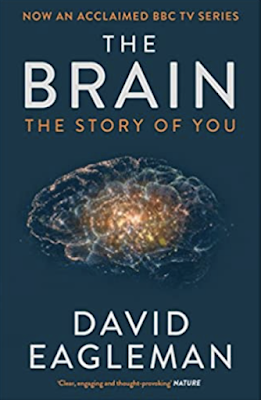The first book of 2022. What a fascinating read it was! I was pleasantly surprised to see this book on Kindle Unlimited and got completely hooked onto it this New Year weekend.
It was so inspiring to see how the author, in his quest towards unraveling the workings and future potential of the human brain, has brought up the interlinkages cutting across multiple fields - neurobiology, philosophy, psychology, technology, AI, robotics, etc.
The book starts with answering the fundamental question - "Who am I" from the point of view of the brain. Our life experiences shape our brain circuitry. The author takes us on a journey of how our brain grows and changes from birth, childhood, adolescence, adulthood to old age.
"Neurally speaking, who you are depends on where you’ve been."
The lack of preparedness during birth (as compared to animals) gives us the flexibility to adapt and thrive in different environments. The author calls this attribute as being "live wired", as compared to "hardwired" instincts and behaviors that many animals are born with.
"It’s not just illness or chemicals that change us: from the movies we watch to the jobs we work, everything contributes to a continual reshaping of the neural networks we summarize as us."
The author then explains how we experience reality and how the brain processes inputs from different senses, processing only the minimal amount needed for us to navigate the world.
"Our perception of reality has less to do with what’s happening out there, and more to do with what’s happening inside our brain."
My favorite chapter in the book is the one titled "Who's in control?". It argues that our conscious mind isn't involved in several actions we take for granted in a day. The behind-the-scenes narrative of what happens during a daily activity like lifting a cup of coffee and taking a sip was just mind-blowing.
"the conscious you is only the smallest part of the activity of your brain. Your actions, your beliefs and your biases are all driven by networks in your brain to which you have no conscious access."
"Consciousness gets involved when the unexpected happens, when we need to work out what to do next"
The chapter on decision making has some interesting examples and case studies related to instant gratification, willpower (ego depletion) and the impact of past experiences and body sensations on present decisions.
"the key business of brains is to predict. And to do this reasonably well, we need to continually learn about the world from our every experience"
The importance of social connection and its relevance to brain function is another insightful chapter, that talks about how we are preprogrammed to read subtle facial, auditory, and other sensory cues and how empathy works in the context of the pain matrix of the brain.
The final chapter talks about the plethora of possibilities that open up at the intersection of neurobiology and technology. I found it harder to comprehend or even imagine the potential use cases. It explores whether consciousness can be transferred, if thoughts can exist outside the realm of biological origins, if we can extend ourselves beyond our flesh. This chapter just went way over my head🙂
This statement is such a fitting end to this remarkable book
"Our species is just now discovering the tools to shape our own destiny. Who we become is up to us"
